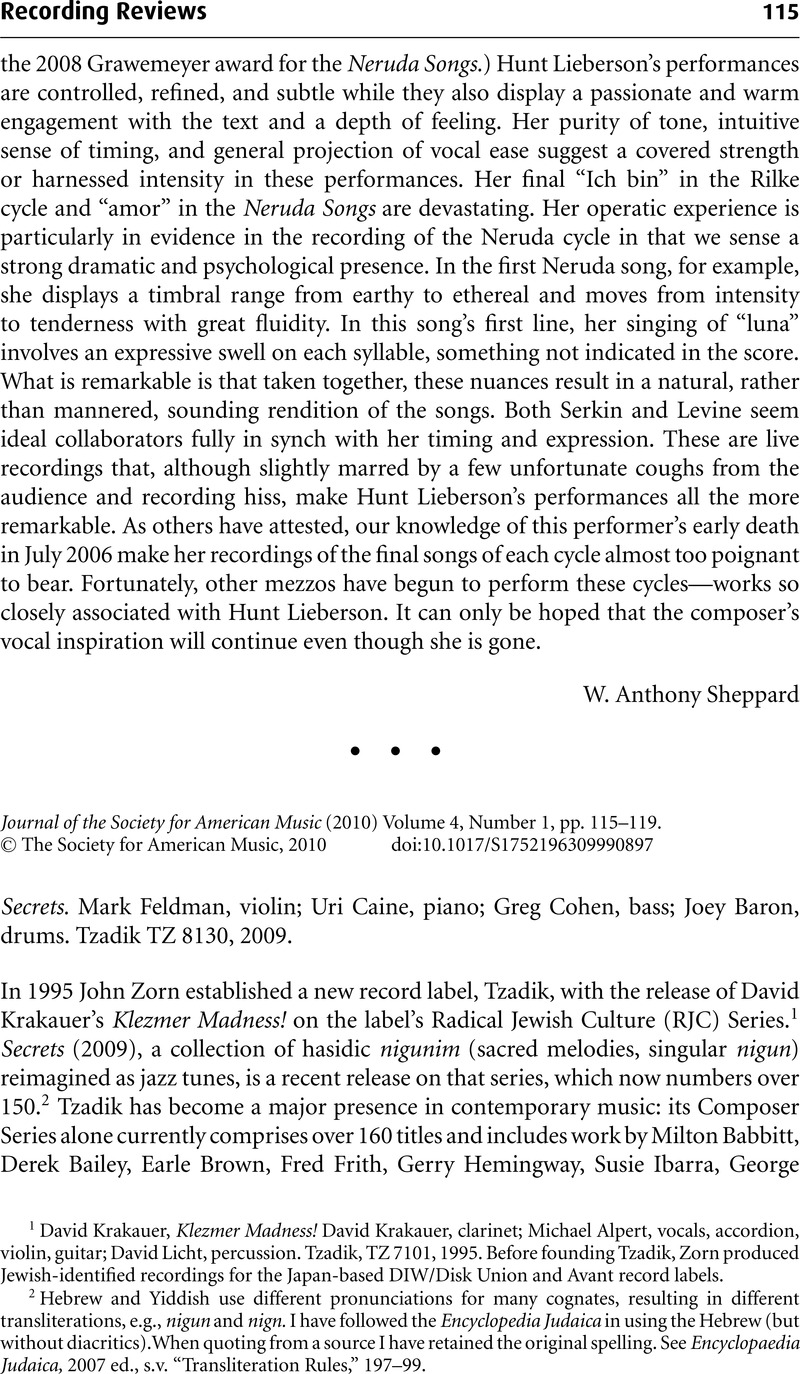No CrossRef data available.
Published online by Cambridge University Press: 14 January 2010

1 David Krakauer, Klezmer Madness! David Krakauer, clarinet; Michael Alpert, vocals, accordion, violin, guitar; David Licht, percussion. Tzadik, TZ 7101, 1995. Before founding Tzadik, Zorn produced Jewish-identified recordings for the Japan-based DIW/Disk Union and Avant record labels.
2 Hebrew and Yiddish use different pronunciations for many cognates, resulting in different transliterations, e.g., nigun and nign. I have followed the Encyclopedia Judaica in using the Hebrew (but without diacritics).When quoting from a source I have retained the original spelling. See Encyclopaedia Judaica, 2007 ed., s.v. “Transliteration Rules,” 197–99.
3 John Zorn, “Radical Jewish Culture” (2006). Online at Tzadik Records, http://www.tzadik.com. All Web sites cited here were accessible as of 5 August 2009.
4 Zorn, in Bill Milkowski, “John Zorn: The Working Man,” JazzTimes (May 2009), 7. For example, see Zorn, O'o. Cyro Baptista, percussion; Joey Baron, drums; Trevor Dunn, bass; Marc Ribot, guitar; Jamie Saft, piano, organ; Kenny Wollesen, vibraphone. Tzadik TZ 7376, 2009.
5 See “Musical Tikkun” in Ellen Koskoff, Music in Lubavitcher Life (Urbana: University of Illinois Press, 2001), 76–79.
6 A publication attesting to the current relevance of nigunim in Reform Jewish congregations is Joel N. Eglash and J. Mark Dunn, eds., Nigun Anthology, vol. 1 (New York: Transcontinental Music Publications, 2004), score and compact disc set.
7 Hasidic dynasties are usually named for the town in which the dynasty was founded.
8 Contrary to the notes, at least one of the pieces is not a hasidic nigun: “Avinu Malkenu,” a liturgical melody sung during the High Holidays, was written by composer Max Janowski (1912–91) in 1967. Another nigun appears to be linked to a hasidic dynasty not mentioned in the notes. The tune used here for “Z'chor Davar” (“Remember Thy Word,” text from Psalms 119:49–51) is attributed elsewhere to Rabbi Eliezer Zisya Portugal Shlita, the rebbe (spiritual leader) of the Skolen hasidic dynasty. See “Z'chor [zechar davar leAvdecha],” on David Werdyger, Skulaner Chassidic Nigunim, Aderet LPW–304. Online at the Dartmouth Jewish Sound Archive, http://www.dartmouth.edu/~djsa/view_song.php?songId=6593.
9 Koskoff, Music in Lubavitcher Life, 88.
10 Shiloah, Amnon, Jewish Musical Traditions (Detroit: Wayne State University Press, 1992), 197Google Scholar.
11 “Kel Adon” and “El Adon” denote the same Sabbath morning prayer; the first spelling reflects the Orthodox Jewish practice of using variants to avoid erasing the name of God from a written document, which is forbidden under Jewish law. Some observant Jews also avoid speaking the name of God aloud. Lubavitcher Hasidism is also known as “Chabad” (a Hebrew acronym).
12 See Kirshenblatt-Gimblett, Barbara, “Sounds of Sensibility,” in Slobin, Mark, ed., Klezmer Roots and Offshoots (Berkeley: University of California Press, 2000), 52Google Scholar; and Slobin, Mark, Fiddler on the Move: Exploring the Klezmer World (Oxford: Oxford University Press, 2000), 105–21Google Scholar. See also Slobin, “Klezmer as a Heritage Music,” in Fiddler on the Move, 11–35.
13 See, for example, Andy Statman Quartet, Between Heaven and Earth: Music of the Jewish Mystics. Andy Statman, clarinets, mandolin; Kenny Werner, piano; Harvie Swartz, acoustic bass; Bob Weiner, drums/percussion; Béla Fleck, five-string banjo; David Grisman, mandolin; Scott Lee, acoustic bass. Shanachie 64079, 1997. See also London/Sklamburg/Caine, Nigunim. Frank London, trumpet; Lorin Sklamburg, voice; Uri Caine, piano. Tzadik, TZ 7129, 1998.